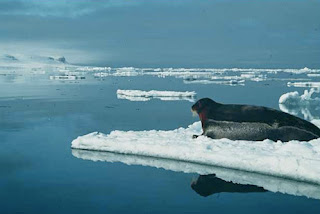There has been a lot of icebergs breaking off Antarctica's ice shelves and the effects this will have on sea levels around the world.
Arctic Ocean sea ice is rapidly melting, and most of the reduction in the ice is in its thickness, and since sea ice is floating ice, its melting won't have much effect on sea levels.
Although, the melting of the Arctic sea ice will have drastic effects on the Earth's surface in the Arctic region, there will be less solar energy reflected back into space and it will instead be absorbed by the ocean water, which becomes with an higer temperature and ends melting the ice.
The sea ice and sheet ice both consist of fresh water, as a result of ice melting the Artic Ocean will have an huge increasement in the ammount of fresh water, this could possibly lead to a shutdown of the North Atlantic thermohaline circulation and drastic cooling of temperatures everywhere.

A bearded seal drifts on an ice floe in the Arctic Ocean near Norway's Svalbard archipelago. The seals are one of many species that depend on Arctic ICE to survive and the sea ice in the Arctic Ocean is melting three times faster than the most advanced climate models predict, raising concerns for humans and wildlife in that region.
Nowadays the sea ice is melting much faster than in any oher time, if this current trends continue, we could be facing an ice-free Arctic summer within the next 50 years.
Sources: http:/ /www.daviesand.com/Choices/Precautionary_Planning/Arctic_Ice/ , http:/ /news.nationalgeographic.com/news/2007/05/070501-arctic-ice.html


Nenhum comentário:
Postar um comentário